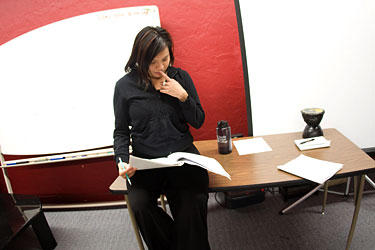Learn More About PUC
Teacher Studies at La Mama
By Lainey S. Cronk on October 20, 2009
Share this

Teo brought ideas and connections back to PUC from her weeks at La Mama.
For two weeks, Mei Ann Teo lived in an old stone mansion in Umbria, the Green Heart of Italy. On a huge stage overlooking the Umbrian countryside, she learned things that "pretty much completely exploded everything I thought I knew about theatre."
With the help of a Herber Grant, Mei Ann Teo, PUC's drama program director, attended the La Mama International Directors Symposium. La Mama, the nation's oldest and most established avante garde theatre, bought land and an old mansion and farm area in Umbria 10 years ago, making it into "the most beautiful place for an international theatre community to come together and learn from each other," says Mei Ann. She studied under four teachers, two each week. One who teaches hip-hop theatre at NYU, one who's famous for her work in documentary theatre, a very famous Japanese director, and Mei Ann's favorite, Romeo Castellucci - who, in addition to exploding what she thought she knew, " reinvigorated my belief and faith in the multitude of ways that it as an art form can reach and transform a human being who is sitting in the community of the audience."
Castellucci started one lecture by saying, "Theatre is the domain of the spirit, and of the spirit I cannot speak." From there, Mei Ann recounts, he "proceeded to have these incredible complex contradictions of every audacious statement he said, but for me every time he hit a contradiction it then all made sense, because then you saw all the facets."
La Mama was truly an international experience, with people from all over U.S., choreographers, puppeteer - including, to Mei Ann's delight, people from Singapore, where she was born. The workshop participants studied in the indoor studio or the outdoor stage on a field overlooking the countryside. The 15 people in a group would study from 9 a.m. to 1 p.m. with one teacher, have an afternoon siesta, and then work with another teacher from 4 to 8 p.m.
The experience was a chance for Teo to refresh her perspective as a teacher. "I love going to these programs because it reminds me what it's like to be an actor, what it's like to be a student," she says. "As teachers we forget how much pedagogy matters, how you teach is just as important as what you teach. So it was fantastic for me to regain the critical eye of the student."
That's why La Mama had direct impact for Teo's work at PUC. But another dimension made the connection even more personal: "I feel like part of me went and saw it through the framework of 'how would Evie react to this, how would Twid react to this,'" she says, referring to some of her drama students. "I felt like I represented my crew." She also met several people at the institute that she hopes will come to PUC in the future, including a world-class Russian costume designer who's touring the U.S. on a major theatre grant and already came to PUC to do a workshop. But in the bigger picture, what she learned from the directors about how they train and frame rehearsals, she's brought back to the PUC program "so our program is at the cusp of what American theatre is doing - and in fact international theatre."
Latest News
16 Schools Compete in Pioneers Invitational Academy Basketball Tournament
By Ally Romanes on February 5, 2026
Jordan Delarmente: Christ-Centered Service in the Military
By Marina Maher on January 29, 2026
Charlie: The Aviation Program’s New Vessel for Service and Mission
By Marina Maher on January 26, 2026
PUC’s Business Program Earns Reaccreditation
By Ally Romanes on January 21, 2026
